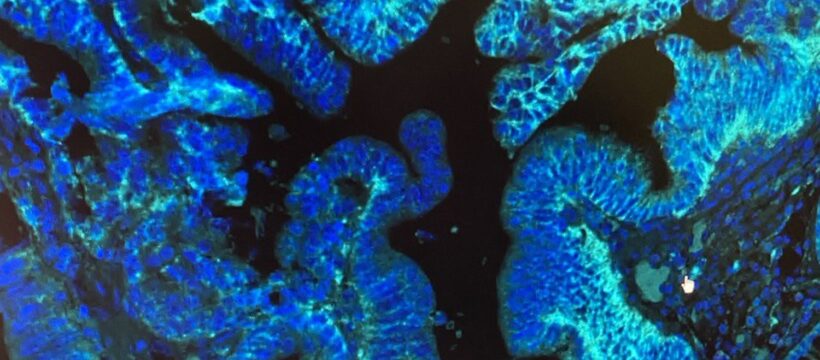Late line monoclonal antibody therapy for the treatment of metastatic colorectal cancer appears to be effective even in the presence of mutations in a proto-oncogene. Karl Landsteiner University of Health Sciences is an important study partner.
Krems (Austria), 19. December, 2023: A recently approved combination therapy for the treatment of metastatic colorectal cancer appears to work regardless of the mutation status of the proto-oncogene RAS. This is shown by a study conducted by five Austrian cancer centers, which evaluated data from over 120 patients and have now published their results. These results provide clear evidence that the addition of the monoclonal antibody bevacizumab to previous standard therapy (FTD/TPI) ensures treatment efficacy even in the presence of a common and problematic mutation (KRAS G12).
Trifluridine/tipiracil (FTD/TPI) remains the standard of care for late-stage metastatic colorectal cancer. Trials are now looking at adding a monoclonal antibody called bevacizumab to this regimen to further improve efficacy. But can this new combination therapy also alleviate a suspected problem with standard FTD/TPI therapy, which is reduced efficacy in the presence of a mutation known as KRAS G12? A team from five Austrian clinical and academic centres, including the Karl Landsteiner University of Health Sciences (KL Krems), has now addressed this question – and found encouraging answers.
Most Common Mutation
In fact, KRAS G12 is by far the most common mutation in metastatic colorectal cancer, and an FTD/TPI therapy that works independently of this mutation could provide new treatment options for many patients. The Austrian team has now collected data from 123 patients on their treatment regimen, treatment success and mutation status of the RAS genes. More than 100 of these patients had previously been treated with FTD/TPI plus bevacizumab.
Commenting on the results, Priv.-Doz. Dr. Hossein Taghizadeh, PhD, MSc from the Gastrointestinal Oncology Working Group at the Department of Internal Medicine 1 at the University Hospital St. Pölten, one of the teaching and research sites of the KL Krems, commented: „In short, our results provide solid evidence that the combination with bevacizumab is effective in the treatment of FTD/TPI regardless of RAS mutation status – even in the presence of KRAS G12. This would indeed provide a better treatment option for the large number of patients with this mutation.“
Wild Type Versus Mutation
In detail, the analysis showed that the median overall survival of patients with the wild type form of RAS was 9.63 months, while the group of patients with RAS mutations had an overall survival of 8.78 months. The difference was not statistically significant. „We then compared the overall survival of patients with only the KRAS G12 mutation with that of all other patients, i.e. those who carried other RAS mutations or the gene in wild type form,“ explains Priv.-Doz. Dr Taghizadeh, PhD, MSc, further details of the study. „Again, there was no statistical difference in overall survival. This is a clear indication that the addition of bevacizumab to the FTD/TPI-therapy may also improve the treatment of tumors with RAS mutations, particularly KRAS G12.“
Together, the team has achieved an internationally recognised result with important implications for the treatment of metastatic colorectal cancer. In addition to the KL Krems other Austrian institutions involved in the study included the Ordensklinikum and the Johannes Kepler University (Linz), the Medical University of Graz and the state hospitals in Wiener Neustadt and Rohrbach.
Original publication: Bevacizumab mitigates codon-specific effects of trifluridine/tipiracil on efficacy outcome parameters in metastatic colorectal cancer. B. Doleschal, H. Taghizadeh, T. Lentner, J. M. Riedl, J. Granitzer, D. Morariu, J. Decker, K. J. Aichberger, G. Webersinke, P. Kirchweger, A. Petzer & H. Rumpold. ESMO Open, 8(6), 102064. https://kris.kl.ac.at/de/publications/bevacizumab-mitigates-codon-specific-effects-of-trifluridinetipir
About Karl Landsteiner University of Health Sciences (2023)
At Karl Landsteiner University of Health Sciences (KL) in Krems, the comprehensive approach to health and disease is a fundamental objective for research and teaching. With its Europe-wide recognized bachelor-master system, KL is a flexible educational institution that is tailored to the needs of students, the requirements of the labor market as well as the scientific challenges. Currently KL hosts about 700 students in the fields of medicine and psychology. The three university hospitals in Krems, St. Poelten and Tulln as well as ion beam therapy and research centre MedAustron in Wiener Neustadt and the Psychosomatisches Zentrum Waldviertel in Eggenburg ensure clinical teaching and research at the highest quality level. In research, KL focuses on interdisciplinary fields with high relevance to health policy – including medical technology, molecular oncology, mental health and neuroscience, as well as water quality and related health aspects. KL was founded in 2013 and accredited by the Austrian Agency for Quality Assurance and Accreditation (AQ Austria). www.kl.ac.at/en
Scientific Contact
Hossein Taghizadeh, MD-PhD, MSc
Gastrointestinal and Genitourinary Oncology
Working Group
Dept. of Internal Medicine 1
Karl Landsteiner University of Health Sciences
Mitterweg 10
3500 Krems / Austria
T +43 2732 9004 12141
E hossein.taghizadeh@stpoelten.lknoe.at
Karl Landsteiner University of Health Sciences
Eva-Maria Gruber
Communications, PR & Marketing
Dr.-Karl-Dorrek-Straße 30
3500 Krems / Austria
T +43 2732 72090 231
M +43 664 5056211
W https://www.kl.ac.at/
Copy Editing & Distribution
PR&D – Public Relations for Research & Education
Dr. Barbara Bauder
Kollersteig 68
3400 Klosterneuburg / Austria
M +43 664 1576 350
E bauder@prd.at
W https://www.prd.at/

